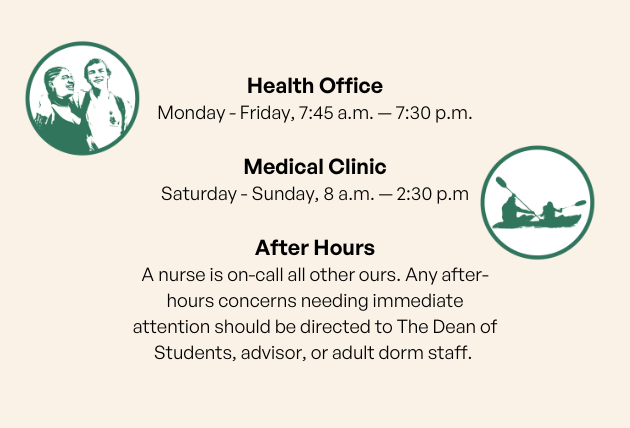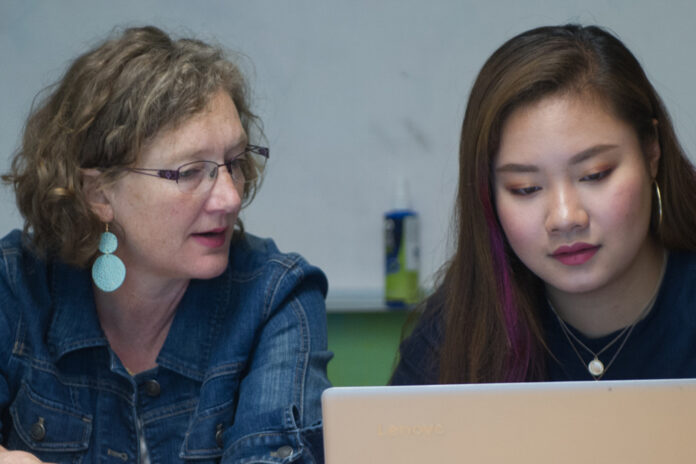Our students are immersed in an environment that challenges them to learn and listen, to share and stretch, to balance their commitment to their own health and growth with that of others at Putney. Learning how to maintain physical and mental health and wellness is critical to this journey. While every adult at Putney is dedicated to supporting our students, we offer additional, specialized resources to help students learn about self care for their minds and bodies, and we provide medical care and counseling when more acute needs arise.

Health Office
At our small, school-based health center and infirmary, we approach student healthcare from a holistic and developmental model. We work closely with families, local and home-based practitioners, and school personnel to assess and support students’ healthcare needs while they are living away from home.
Trusted Local Practitioners
Though the office is not a comprehensive medical clinic, we provide compassionate and thorough care. We frequently refer students to trusted local practitioners for physical therapy, nutrition, sexual health issues, acupuncture, Chinese medicine, massage, and chiropractic.
Hospital & Pharmacy
The nearest hospital is Brattleboro Memorial Hospital, which is approximately 20 minutes away. Our local pharmacy is Greater Falls Pharmacy in Bellows Falls, VT. Daily prescription medications should be filled through Genoa with the Putney address as the shipping address.
Medications
Our medication policy requires that all prescription medications be reported to and stored in the Health Services office. Day-time prescription medications are administered at Health Services. Bedtime prescription medications are kept in a dorm lock-box and administered by dorm heads.
Genoa Pharmacy
Genoa Pharmacy 20176
72 Harrel St. Suite A03
Morrisville, VT 05661
Phone: 802-917-0102
Fax: 802-448-1874
Morrisville-VT-20176@genoahealthcare.com
Pharmacy Site Manager
Steven Collins
scollins@genoahealthcare.com
Hours of Operation
Monday- Friday 8 a.m. – 4:30 p.m.
(Closed for lunch 12:30 p.m. – 1 p.m.)
Health Office
Hours & Appointments

We are not able to refer students for psychiatric care or annual physicals, and we encourage families to address dental, orthodontic, and allergy issues at home. We also do not have a relationship with a local psychiatrist/prescriber, and all medication appointments should be scheduled while students are home on breaks. Although we are able to arrange transportation for an urgent appointment, we are not able to accommodate recurring appointments off-campus. Transportation is billed to the student’s bookstore account.
Health Office Staff




Counseling
We provide accessible, culturally informed, evidence-based, and developmentally appropriate counseling services that empower students of all identities and backgrounds to learn from their experiences, trust in their own abilities, and grow to their fullest potential within our school community. Our services help Putney students reduce psychological symptoms, cope with difficult life events, and experience positive growth in their personal and academic endeavors.
We Believe
Asking for help in times of struggle is integral to becoming a lifelong learner.
Each community member is unique and should be treated with respect and dignity.
Good supportive connections help all community members find hope, meaning, and resilience.
Counseling
Hours & Appointments
Our counselors strive to provide a safe, confidential, culturally aware, and a nonjudgmental environment for students to talk about anything that is troubling them. Our primary goal is to help students resolve what might be interfering with their lived experience at The Putney School. Every family enrolling a student pays a $400.00 mental health fee which provides access to 4 to 6 counseling appointments per academic year. Students wanting more than the allotted six sessions, with approval of their parent or guardian can receive up to ten sessions per trimester. The fee for the additional sessions per trimester is $1, 250.00. Students already working with a counselor from home can utilize a space in Health Services designated for telehealth sessions. Students and families needing local mental health services can be assisted with referrals to vetted mental health professionals. Finally, at least one day a week Counseling Services houses outside mental health clinicians who can work with students. The outside clinicians are not affiliated with The Putney School and will work with families regarding fees for their services.
Students can meet for individual counseling on a weekly, bi-weekly, or drop-in basis. Counselors are available for appointments:
Monday, Wednesday, Friday: 8 a.m. — 5 p.m.
Tuesday, Thursday: 8:30 a.m. — 7 p.m.
Stop by or email counseling@putneyschool.org for an appointment.
Counseling Services
Our mental health professionals provide brief individual counseling, consultation, and campus seminars. Common student concerns include:
Adjustment and phase of life concerns
Stress and emotion regulation
Homesickness
Anxiety
Depression
Grief and loss
Sexuality and identity exploration
Intimate relationship and friendship concerns
Family issues
Social and life skill development
Eating and body image
Substance use
Mental Health Professionals Staff




Equity and Inclusion
The Putney School Counseling Office staff strives to provide services that are uniquely tailored to each student’s needs. Students who seek our services have varied and intersecting relationships with their racial and ethnic identities, gender, sexual identity, social and economic class, religious affiliation, nationality, and/or disability status. We are strongly committed to offering services and programs that are inclusive, and give voice to these varied experiences by providing a safe place for students of all identities to be heard, accepted, and supported. We recognize that the cultures and backgrounds of some students present barriers to accessing counseling services, and understand that we must respond with respect and creativity to create access to culturally appropriate support resources. We also recognize that these goals require all counseling staff to engage in ongoing personal and professional development to deepen and broaden cultural knowledge, self-awareness, and competency.
BIPOC Student Mental Health Resource Guide
Resources curated in support of Putney students who are Black, Indigenous, and People of Color– and to uphold our commitment to diversity, equity, inclusion, and anti-racism.
Treatment Directories
- VT Mental Health and Wellness Practitioners of Color Directory – publicly available and designed to promote the visibility of BIPOC practitioners in Vermont, as well as to facilitate referrals.
- InnoPsych – a directory of therapists of color and wellness resources designed and created for therapists and therapy clients of color.
- TruCircle – find a therapist for in-person or online therapy; search according to zip code and/or presenting concern (e.g. depression, anxiety, grief, stress, etc.)
- National Queer & Trans Therapists of Color Network – healing justice organization that actively works to transform mental health for queer and trans people of color in North America.
- Melanin & Mental Health – a directory promoting and advocating for culturally competent clinicians dedicated to helping minority communities. Search according to clinician ethnicity/race, license type (e.g. psychologist, counselor, life coach, etc.), presenting concern, insurance type, age range, and language.
- Therapy for Black Girls – a directory and online space dedicated to encouraging the mental wellness of Black women and girls. Search according to state licensure, virtual or in-person services, and topics of concern.
- Therapy for Black Men – a directory providing targeted resources and a database of professionals equipped to support men and boys of color seeking mental health support.
- APISAA Therapist Directory – a directory for Asian, Pacific Islander, and South Asian Americans (APISAA). Search according to state licensure; virtual options are available.
BIPOC Mental Health Resources
- The Steve Fund – an organization dedicated to supporting the mental health and emotional well-being of students of color. The organization works with schools, researchers, mental health experts, non-profits, and young people to build understanding and promote strategies for assisting young BIPOC individuals build and maintain positive mental health. The Steve Fund offers student workshops, programs, and services led by mental health professionals. Topics include self-care, racial healing, coping, and addressing microaggressions and racial incidents. Students can also text to connect with live, trained BIPOC crisis counselors.
- BEAM: Black Emotional & Mental Health – a collective of advocates committed to the mental health and healing of Black communities. BEAM’s mission is to remove the barriers that Black people experience in accessing and maintaining access to emotional health care and healing. It fulfills its mission through education, training, advocacy, and the creative arts. Website offers tips, articles, toolkits, worksheets, and video series sharing the voices of Black advocates, writers, artists, and therapists on the most pressing issues in mental health.
- Black Mental Health Alliance – culturally-relevant educational forums, training, and referral services that support the health and well-being of Black people and their communities. Serving clinicians, the community, individuals, families, and children.
- Eustress, Inc. – a non-profit dedicated to bringing awareness to the importance of improving and preserving mental health within the Black community. Eustress provides mental health management and supportive resources through educational content, interactive programming, and strategic partnerships with other mission-driven organizations, paying special attention to students, young adults, and athletes.
- National Queer & Trans Therapists of Color Network: Mental Health Fund – provides financial assistance to queer and trans people of color to increase access to mental health support for and by QTBIPoC. The program is designed to provide financial support for QTBIPoC to work with psychotherapists in an effort to address the economic barriers inherent in healthcare and the mental health system.
- Harriett’s Apothecary – an intergenerational healing collective led by Black Cis Women, Queer and Trans healers, artists, health professionals, magicians, and activists committed to co-creating accessible, affordable, liberatory, healing spaces that recognize and inspire people who identify as Black, Indigenous, and People of Color. Free to sliding scale services, workshops, events, leadership training, and listening circles offered seasonally.
- Black Men Heal – provides access to mental health treatment (up to 8 free sessions, application needed), psychoeducation, and community resources to men of color. Goals include removing stigma, matching providers and clients, and reducing/eliminating costs of mental health treatment.
- Latinx Therapy – provides wellness and mental health resources (podcasts, YouTube channels, apps en espanol and English).
- We R Native – comprehensive health resources for Native youth, by Native youth, providing content and stories about the topics that matter most to them. We R Native strives to promote holistic health and positive growth nationally.
- Asian Mental Health Collective – aims to de-stigmatize and normalize mental health within the Asian community. Provides hotlines, mental health faq (frequently asked questions), organizations directory arranged by country/state, and a therapist directory.
- Brown Girl Therapy – mental health community for “all children of immigrants to explore bicultural identities and discuss taboo topics as they pertain to mental health and wellness in this world and in relationships.” Includes online community, newsletters, resources, news/events, and other tips and resources.
Apps
Podcasts
Watch
- Basic Black: WGHB Studios in Boston – the longest running program on public television focusing on the interests of people of color. Each episode features a panel discussion across geographic borders and generational lines with the most current stories, interviews, and commentaries.
Self-Care for Individuals Who Are Black, Indigenous, and People of Color
Counseling Office Professional Development– Advancing Culturally Competent Care
(Please note that this inclusion is meant to create transparency into the on-going education and training of the Putney Counseling Services staff. Annual professional development in the areas of multicultural competence, culturally conscious therapeutic practice, and social justice are mandatory for our staff, per the Putney Counseling Office Policies & Procedures.)
- 2-part workshop with AISNE: Understanding Microaggressions In the Age of Black@ (9/22/21)
- 2021 Martin Luther King Jr. Day 21 Day Equity Challenge with Lisa Muñoz, Putney School Director of Equity & Inclusion (January-February 2021)
- 3-part interactive workshop with Dr. Liza Talusan, nationally recognized facilitator, educator, and strategic partner in issues of race, racism, and difficult conversations (2/3/21, 2/10/21, 2/17/21)
- Putney School staff/faculty DEI and Anti-Racist working group– Topic: Equity & Acess to Campus Resources (Winter & Spring Terms 2021)
- Social Injustice & the Power of Somatic Therapy, presented by Glenda Clare, PhD, LCAS, CCS, LAPC (Summer 2021)
- Cultural Somatics, presented by Resmaa Menakem, healer, author, and trauma specialist (Summer 2021)
Please feel free to email counseling@putneyschool.org to suggest additional resources or discuss any of the resources listed above.
This guide is intended to provide users with general information. Putney Counseling Services staff do not endorse any specific professionals, tests, products, procedures, opinions, or other information that may be mentioned within this guide. These resources are to be utilized at the discretion of the user.
BIPOC Substance Use Support
Treatment Directories
- Resources for Indigenous Women – This guide features plentiful resources to empower and strengthen Indigenous Women. The guide was put together by the team at Southeast Addiction Center.
- Support for BIPOC Parents – An extensive resource list curated for BIPOC parents. This guide was put together by the experts at Louisville Addiction Center.
- Resources for Indigenous Women – This guide features plentiful resources to empower and strengthen Indigenous Women. The guide was put together by the team at Southeast Addiction Center.
- Live Another Day – Live Another Day was founded with the purpose of providing equal access to life-saving resources. They offer dozens of resources for finding help for mental health and substance use.
- Resources for Black Women – Newly updated for 2023, this guide features over 50 fully-vetted resources for Black women written by the team at Southeast Detox.
Sexual Misconduct Resources
Handbook Information
Definitions
Sexual Misconduct
Sexual misconduct is corrosive to the community. Any sexual misconduct which endangers the health or wellbeing of another student may result in dismissal.
Sexual misconduct includes:
- Sexual assault: Non-consensual sexual intercourse or sexual contact.
- Sexual exploitation: Taking non-consensual sexual advantage of another, including but not limited to secret videotaping, sharing private nude pictures with third parties, or knowingly exposing another to an STD or to pregnancy or paternity.
- Relationship violence: Violence against a student by a person who is or has been in an intimate or romantic relationship with that student.
- Relationship misconduct: Threatening or coercive behavior that does not involve physical contact or violence, but that occurs in the context of a dating relationship. Examples include but are not limited to threats of violence, violation of another’s privacy or threats to do so, or physical restraint.
- Stalking: A course of conduct directed at a specific person that would cause a reasonable person to fear for their safety or suffer substantial emotional distress.
- Sexual Harassment: Unwanted, severe, pervasive and objectively offensive interactions that are either physical or verbal in nature with some reference to sexuality, including but not limited to the use of offensive sexual language, and/or jokes of a sexual nature.
Consent
If Putney students choose to engage in sexual activity with each other, they must both understand and abide by the rules of consent.
- The age of consent in Vermont is 16, unless both people are between the ages of 15 and 18. A person under the age of 15 can never consent to sex. (13VSA 3252)
- Consent cannot be inferred by the absence of “no.” Clear affirmative consent by words or by actions is necessary.
- Consent to some sexual acts does not imply consent to others, nor does past consent to a given act imply present or future consent. Consent must be ongoing and can be revoked at any time.
- Consent obtained by threat, coercion, or force does not constitute consent.
- Consent cannot be obtained from someone who is asleep or otherwise mentally or physically incapacitated, whether due to alcohol, drugs, or some other condition.
Faculty and Staff
Because of the professional responsibility of Putney faculty and staff to students, any intimate or sexual relationship between a Putney employee and Putney student will be grounds for immediate termination of employment by the adult involved and a report to legal authorities, regardless of the age of the student.
Privacy and Mandatory Reporting
Privacy and Mandatory Reporting
Complaints of sexual misconduct, bullying, harassment or hazing to Putney will be kept private to the greatest extent possible. However, Putney does have legal and ethical obligations to share certain information with a limited number of people. As Putney is entrusted by families with their students’ care and safety, the School needs to let parents/guardians know if their child has shared a complaint of conduct that may have significantly compromised their safety.
All Putney School employees, including counseling and health staff, are mandated reporters under Vermont Law, and therefore required to report to the appropriate state agency any sexual activity between a person over 18 years old and a person under 16 years old (if both are students), and any allegation of sexual misconduct. As noted above, no sexual contact between any adult employee of the school (anyone over age 18) and any student—regardless of age—is permitted and any such sexual contact will be reported to law enforcement.
Making a Complaint
Making a Complaint of Sexual Misconduct, Harassment, Bullying, or Hazing
Sanctuary and Sexual Misconduct, Harassment, Bullying and Hazing
Student safety, and encouraging students to report to Putney when students safety is compromised, is of the utmost importance. Therefore, students who believe they have experienced sexual misconduct, harassment, bullying, or hazing and wish to report it will not face disciplinary action for their own conduct concerns connected to the incident(s), such as use of prohibited substances or violating other residential expectations. There is no need to specifically request sanctuary from the Dean of Students in these cases. See “Sanctuary” in the Student Handbook for more information.
Making a Complaint to Putney
Any individual who believes that they have been harassed, bullied, or hazed, or who
witnesses or believes they know of a student who has been, and any student who believes they have experienced any form of sexual misconduct, should promptly report this to the Dean of
Students, the Director of Health Services, or the Director of Counseling, or another trusted school employee. Please keep in mind the mandatory reporting obligations noted above. Complaints may also be submitted directly to the Interpersonal Behavior Committee (IBC) at ibc@putneychool.org.
Any student may seek information about the process of reporting a complaint by talking with the Dean of Students, a member of the counseling or health office staff, a member of the IBC, or another Putney School adult. Gathering information about reporting processes and support resources without disclosing information does not generally require a mandated report on the part of the staff member.
Making a Complaint of Sexual Misconduct to Law Enforcement
Any student who wishes to report a complaint of sexual assault, relationship violence or stalking directly to law enforcement may do so. Putney staff, such as an IBC member, the Dean of Students, or a counselor or nurse, can provide support and assistance with this process.
Interpersonal Behavioral Committee (IBC)
Interpersonal Behavior Committee (IBC)
The Interpersonal Behavior Committee (IBC) consists of 3-4 faculty and staff members appointed by the Head of School. The IBC investigates complaints of harassment (including sexual harassment, and microaggressions that may also constitute harassment), bullying, hazing, and sexual misconduct, and recommends appropriate actions to the Head of School. The IBC may also meet with students having an interpersonal conflict for which adult support and mediation may be helpful. Students may request to meet with the IBC directly (and may ask any Putney adult for guidance and support with this request), or an IBC meeting may be arranged by the Dean of Students when conflict resolution support for students is needed. Students may contact the IBC directly to submit a complaint of harassment (including sexual harassment), bullying, hazing, or sexual misconduct, or to request assistance with an interpersonal conflict, at ibc@putneyschool.org. The membership of the IBC can be found in Contact Information.
IBC Process
The goal of the IBC process is to better understand what has occurred, and to explore its impact on the involved individuals and on the Putney community, through a fair and impartial process. The IBC will then recommend a course of action to the Head of School that may be restorative, educational, and/or disciplinary, as appropriate.
When a complaint has been received by the IBC, the committee will acknowledge its receipt to the reporting individual(s). They will also notify the targeted student(s), if the complaint was submitted by a third party, and the student(s) whose conduct is in question that the IBC will be gathering information about the matter. The IBC will generally meet individually with all involved parties as appropriate. This may include the individual(s) who submitted the complaint; the alleged target(s); and witnesses and other individuals who may have relevant information, including teachers and parents. In more complex cases, the Head of School may appoint an appropriate internal or external professional to gather information in place of the IBC. In undertaking the process of looking into the complaint, Putney will handle private information with sensitivity, and will not disclose information about the matter or identify the involved students to anyone unnecessarily.
As noted above, in certain circumstances, the school may be obligated to report misconduct to external authorities, such as to law enforcement or the local child welfare agency. Putney cooperates with external agencies and may postpone its own investigation into misconduct as appropriate. Please see the Privacy and Mandatory Reporting policy, above, for more information.
Cooperation and Honesty
Students are expected to cooperate in IBC processes and to be honest when doing so, even when there may be personal or social pressures to do otherwise. Failure to cooperate with an investigation may itself be cause for disciplinary action. If a student refuses to participate or cooperate at any stage of an IBC process for any reason, Putney reserves the right to take action, including proceeding without a statement from the student, or to require the student to withdraw from Putney.
Interim Measures and Administrative Leave
Putney may take interim remedial measures while the school is looking into the complaint. Examples of interim measures include, but are not limited to, ordering no contact between individuals, changing schedules or classes, or other actions to create space between individuals.
In certain cases, a student may be required to go on an Administrative Leave while a matter is in the process of being investigated. An Administrative Leave is considered a non-disciplinary leave, and does not reflect a conclusion by the school of any wrongdoing. During an Administrative Leave, Putney will work with students to continue their educational experience to the extent possible, such as through tutoring, online learning and other methods.
Putney reserves the right to retain or dismiss a student no matter the decision by the state to pursue a report, or a legal decision by the state resulting from a report.
False Complaints
All students involved in an IBC process should understand that false or exaggerated accusations can be extremely damaging; therefore, Putney expects and requires the honest and full disclosure of facts by all involved individuals. Any person who knowingly makes a false accusation of bullying, hazing, harassment, sexual misconduct, or retaliation, or fails to fully disclose relevant information, may be subject to disciplinary action.
Retaliation
Retaliation is any form of intimidation, reprisal, or harassment directed against a student who reports misconduct. Retaliation may include but is not limited to ostracizing, threatening, or spreading rumors or misinformation about the reporting or targeted student(s), or abusing the power of a student leadership position in order to unfairly burden the reporting or targeted student(s). Anyone who retaliates against a complaint of harassment, bullying, hazing, or other serious misconduct is also in violation of school policy. A student may violate this anti-retaliation provision regardless of whether the original complaint turns out to be true, or whether the retaliation was not intended to be harmful (“it was just a joke”). Individuals who themselves are not complainants, but who participate in an investigation, for example, as witnesses, will also be protected from retaliation under this policy.
Student Bystander Responsibilities
Putney expects that any student who has knowledge that any form of bullying, hazing, harassment, sexual misconduct, or retaliation will occur, is occurring or has occurred, if they feel comfortable doing so, will take reasonable steps to prevent that activity or stop it from going any further. Students are encouraged and expected to report knowledge of any of these behaviors, including sexual misconduct, to a responsible adult at the school. Every effort will be made to maintain confidentiality.
In addition to, or as an alternative to filing a harassment complaint under this policy, a person may file a harassment complaint with the Vermont Human Rights Commission or the Office for Civil Rights of the U.S. Department of Education at the addresses noted below:
Vermont Human Rights Commission
14-16 Baldwin Street
Montpelier, VT 05633-6301
(800) 416-2010 or (802) 828-2480 (voice)
(877) 294-9200 (tty)
(802) 828-2481 (fax)
Email: human.rights@state.vt.us
State of Vermont Attorney General’s Office
Civil Rights Unit
109 State Street
Montpelier, VT 05602-1001
(888)745-9195 (Toll Free VT) or (802) 828-3657
(802) 828-3665 (tty)
(802) 828-2154 (fax)
Office for Civil Rights, Boston Office
U.S. Department of Education
8th Floor
5 Post Office Square
Boston, MA 02109-3921
617-289-0111 (voice) 877-521-2172 (tdd)
617-289-0150 (fax)
Email: OCR.Boston@ed.gov
Care
Helping a Friend
The content below provides information, suggestions, and resources to help you be a supportive friend to someone who has experienced an unwanted sexual experience, relationship abuse, and/or stalking.
It can be upsetting to see a friend struggling or in pain.
Providing support to someone who has experienced an unwanted sexual encounter or an abusive relationship is no different. These experiences can take away people’s sense of power and leave them feeling helpless. Offering gentle, consistent, and nonjudgmental friendship and support can alleviate the difficult emotions your friend may feel.
Regardless of your own knowledge or experience with sexual or relationship abuse, you can play a key role in supporting your friend and restoring their sense of control. You can:
- Help her focus on her strengths.
- Provide a safe place for them to explore their emotions.
- Reinforce that he is not responsible for being assaulted, stalked, or mistreated.
- Reassure her that she has the right to any and all feelings, even if they’re conflicting and confusing.
- Share resources for additional support.
Listen and Believe
Active listening–fully concentrating on what is being said, with all of your senses, and with an open mind and heart–is an important skill when helping a friend.
DO
- Believe your friend’s experience, no matter how strange, upsetting, or unlikely the events may seem.
- Accept and honor her emotions without judgment.
- Be honest. You may not “understand,” but you can empathize and care.
- Reflect. The only way to ensure that you understand is to ask. Try something like: “It seems like you are feeling . . .” or “Do you mean . . .?”
- Allow them to define their experience on their own terms. Imposing labels or definitions takes away their right to make sense of their experience for themselves.
- Meet him wherever he is in her process of healing, understanding, willingness to talk, or asking for help. His needs will shift over time; remain flexible and present.
- Thank them for trusting you, and respect their privacy by keeping the information confidential. If your friend has shared their experience with others, ask permission before having conversations about your friend with others.
AVOID
- Suggesting how he should feel—for example, indicating that he should feel more outraged, or that he should calm down.
- Advice that begins with “don’t.”
- Trying to “fix” or “rescue” her. Instead, support her in charting her own path.
- “Investigating” or probing for more information than your friend is willing or able to share. Avoid “why?” questions, as they can imply blame.
- Taking matters into your own hands by communicating with or about, or organizing others against, the offender. You may be unintentionally worsening the situation for your friend.
Help Restore Control
Interpersonal violations can profoundly undermine someone’s sense of control—over their safety, over their decisions, even over their own bodies. Rather than acting for them, which might unintentionally reinforce their sense of powerlessness, ask questions to help them identify their needs. Then ask what role you can play in helping them meet those needs, understanding that they likely will change over time.
Sometimes the simplest questions are the most important ones:
- “Do you want to talk about it?”
- “What do you think you need the most right now?”
- “What can I do to help?”
- “Is it okay for me to give you a hug?”
- “Would it be helpful if I . . .?”
Understanding Reactions
Some of your friend’s decisions, actions, and feelings may appear strange when considered in the context of what we might expect under “normal” circumstances. However, your friend’s experiences may have caused strong and confusing feelings, and in some cases, some trauma. Although some responses are more commonly seen, there is no reaction to sexual assault or relationship abuse that is “normal” or “abnormal.”
Common reactions
- Shock, confusion
- Memory loss or trouble accessing memories
- Depression
- Denial, minimization, attempt to “normalize” their experience
- Mistrust of self and others
- Shame, guilt, self-blame
- Anxiety
- Isolation
- Anger
- Physical distress: shaking, nausea, loss of appetite, etc.
Your friend may cycle through some of these feelings and experiences in no particular order, or may not experience any of them. Some feelings may recur after a period of “normalcy,” and this may feel discouraging. Encourage them to be patient and to understand that this may take some time, and that there is no “right” way to feel.
In some cases, it will be best to continue to be a nonjudgmental and supportive presence.
However, in other cases it is important to share your concerns with people who can offer more specialized support. For more information, see When and How to Seek Help below.
The Pace of Recovery
It may take your friend a while before they are ready to look closely at their experiences and begin to explore their needs. Your friend’s most immediate need may be to try to regain a sense of normalcy in their life, and this may require them to consciously or unconsciously postpone acknowledging their own distress. It can be frustrating if your friend opts not to seek immediate care from a counselor, report their experience right away, or file a complaint. Be patient with them, and understand that they may be using every bit of energy just to function at a basic level. Helping them regain their sense of control means letting them set the pace.
Considering Filing a Complaint
If your friend is struggling with whether or not to file a complaint with Putney or with the police, it may be helpful to reassure them that they do not need to make a decision immediately. You also can gently suggest that they preserve as much information as they can in case they decide to pursue a complaint in the future. This can include writing down their best recollection of what took place, including locations, estimated timing, witnesses, or names of people with whom they may have communicated immediately before and after the incident, and preserving any relevant texts, photos, social media, or other records.
You can let them know that they can learn about the process of filing a complaint at Putney or with the police before they make a decision about what they would like to do, and without sharing any information about their experience.
Partner Abuse and Unhealthy Relationships
Intimate partner abuse, also known as domestic, relationship, or dating abuse, is a pattern of behavior used by someone to gain or maintain power and control over their partner. Intimate partner abuse may include physical, sexual, verbal, and psychological actions or threatened actions.
Signs that someone is experiencing abuse may include any of the following:
- She seems afraid or anxious to please her partner.
- They frequently check in with their partner and often receive harassing calls or texts from their partner.
- He talks about his partner’s temper, jealousy, or possessiveness.
- She is rarely out without her partner, and she misses commitments without explanation.
- They have frequent injuries.
- He exhibits personality changes (e.g., an outgoing person becomes withdrawn or reflects low self-esteem when he used to be confident).
- She is depressed or anxious.
What can I do?
- Because student safety is our priority, students will not get in trouble for conduct concerns when they are related to being the target of sexual misconduct, sexual harassment, relationship abuse or stalking. Notifying a Putney adult about your concern for your friend’s safety will not result in discipline for you or your friend.
- Reach out to resources for yourself. A counselor, dean, or any Putney adult with whom you are comfortable can partner with you to figure out the best way to support your friend and increase her safety.
- Identify resources for your friend that can provide information, support, and guidance. (See Sexual Misconduct Resources)
- Tell your friend you are concerned for their safety and want to help. Using specific observations can be helpful: “They grabbed your arm really hard and that made me worried.”
- Follow his lead. It may be difficult for him to talk about the situation. Consistently offering support and concern lets your friend know that you are a safe person to talk to whenever he is ready.
- Share your concerns with a member of the IBC (ibc@putneyschool.org).
- If you fear someone may be in immediate danger, find a Putney adult right away.
Stalking Concerns
Stalking consists of a series of behaviors that can escalate and create an atmosphere of intimidation, discomfort, and fear for the stalker’s target and for others close to them. Stalking actions may seem innocent at first—an anonymous note, someone showing up at unexpected times in unexpected places, unwelcome communications through social media, small gifts, and other expressions of interest. If the target of that attention communicates that they are not interested but the actions continue, safety concerns arise.
Some stalking behaviors result from misreading cultural cues. Many forms of entertainment wrongly suggest that “persistence” in expressing romantic interest is appropriate, and people who accept this belief can be unintentionally insensitive to respecting boundaries. Regardless of intention, pursuing another person’s attention after they have expressed disinterest is not acceptable at Putney.
Because early incidents may seem harmless on their own, it can be easy for stalking targets, and their friends, to fail to recognize them as part of a disturbing pattern and to minimize their importance. As a friend, you can play an important role in helping identify concerns and seek support.
Trust your instincts
If someone’s actions are disconcerting or feel “creepy” or unwelcome to you or your friend, share your concerns with each other and validate them.
Communicate clearly
Support your friend in sending a clear message to the individual that they do not want the unwanted attention to continue. Talk to an adult with whom you or your friend feel comfortable.
Help your friend recognize and record patterns
Make a list of all the direct and indirect contacts you and your friend believe a person has initiated, even those you feel may have been coincidental. Save emails, text messages, phone records, and other evidence.
Seek help as soon as possible
Stalking can escalate quickly, so it is important to reach out early to an adult, who can recognize when safety risks arise. Do not hesitate to “overreact” by involving an adult if you feel someone is in immediate danger.
Taking Care of Yourself
It’s really hard to watch someone you care about deal with sexual assault, relationship abuse, or stalking, and it is likely to take an emotional toll on you. These feelings are normal, but they can be difficult to handle while you also are trying to be a supportive friend.
Things you may feel:
- Shock and disbelief
- Rage and helplessness
- Fear for your friend’s safety or health
- Preoccupation with the event and its aftermath
- Loss of security and trust
- Confusion about your friend’s responses and needs
- Guilt or responsibility for your friend’s experience
It is just as important to care for yourself in times of stress as it is to care for others, and to seek support from someone you trust. It is also important to acknowledge your own limits. While you may care deeply for your friend and may be honored by their trust in you, you are not a trained counselor. We all want to extend ourselves beyond our normal limits when someone is in crisis, but when this begins to affect your own ability to function, or leads you into situations for which you are not trained, no one is well served. In these situations, it is best to be honest with yourself and your friend about your limits.
Consider the following language:
- “You deserve to get the best possible care and support. I’m not trained to give that to you, but let’s work together to figure out who can.”
- “I’m not sure what the next best step is, but I know how to find someone who can help.”
- “I really want you to get the right information and care. Can we talk about some resources that might be helpful?”
See Local and National Resources above for more information.
How to Seek Help
You can serve an important role by helping your friend to connect voluntarily with resources. Unfortunately, you also may find yourself in situations in which you are so concerned about your friend’s well-being that you need to seek help with or without your friend’s permission. If your friend is in danger, either from others or from themselves, you must reach out to an adult.
Examples of emergencies:
- Any situation in which immediate danger or threat is present
- A serious flashback or dissociative episode
- Suicidal thoughts, with a plan and/or the means
- Threats of harming others or property, with a plan and/or the means
- Stalking concerns, no matter how mild the stalking actions appear to be
In any unsafe situations, contact a member of the Counseling or Health Office during business hours, or any Putney adult during or outside of those hours. In cases where your friend is thinking or talking about suicide, it is imperative that you communicate your friend’s statements to a Putney adult as soon as possible. Do not be afraid to overreact. If you are conflicted about whether or not the situation counts as an emergency, err on the side of caution and reach out.
Examples of other concerning situations:
- Your friend is using coping mechanisms that concern you but do not seem immediately life threatening.
- You are worried your friend may be in an abusive relationship, but you aren’t sure.
- Your friend is missing classes, isolating themselves, eating poorly, or acting in ways that concern you.
- Your friend is suffering from the trauma of sexual or relationship abuse and needs more support from you than you are able to provide.
In situations like these, there are resources available to provide information, help you navigate the complexities of caring for your friend, and assist you with determining if and when you need to take additional steps to support your friend’s safety. See Local and National Resources above for more information.
______
Everyone has a role to play in eliminating sexual and relationship abuse and stalking. Caring for friends—and for yourself—is a critical step on the path, and no one needs to do it alone.
Local and National Resources
Sexual Misconduct, Relationship Abuse, and Stalking
Local Resources
SafeSpace Vermont
866-869-7341 (Mon-Thurs 9am-6pm, Fri 9am-2pm) pridecentervt.org/services
SafeSpace, a service of the Pride Center of Vermont, provides information, support, referrals, and advocacy to lesbian, gay, bisexual, transgender, queer, and questioning survivors of violence and offers education and outreach programs in the wider community. Support services include a hotline during established hours, direct advocacy, one-on-one support, and support groups.
Planned Parenthood Brattleboro
(802) 257-0534
Provides a wide range of confidential sexual and reproductive health and educational services.
PRIDE Center of VT
Pride Center of Vermont (PCVT) is the region’s most comprehensive community center dedicated to advancing community and the health and safety of Lesbian, Gay, Bisexual, Transgender and Queer (LGBTQ+) Vermonters.
National Resources
love is respect
love is respect is the national resource to disrupt and prevent unhealthy relationships and intimate partner violence by empowering young people through inclusive and equitable education, support, and resources.
One Love
One Love’s mission is to educate young people about healthy and unhealthy relationships, empowering them to identify and avoid abuse and learn how to love better.
RAINN (Rape, Abuse & Incest National Network)
800-656-HOPE
This comprehensive national resource for people of all genders and gender identities includes a telephone hotline and a secure instant messaging service. The online hotline is available to anyone directly impacted by sexual assault and connects users with a trained RAINN staff member.
RAINN: Recovering from Sexual Violence
RAINN (Rape, Abuse, & Incest National Network) is the nation’s largest anti-sexual violence organization. RAINN created and operates the National Sexual Assault Hotline (800.656.HOPE) in partnership with more than 1,000 local sexual assault service providers across the country and operates the DoD Safe Helpline for the Department of Defense. RAINN also carries out programs to prevent sexual violence, help survivors, and ensure that perpetrators are brought to justice.
Victim Connect Resource Center: Stalking
The Victim Connect Resource Center offers a comprehensive overview of stalking definitions, resources, and recommendations.
MaleSurvivor
The MaleSurvivor website offers resources, programming, and in- person and online support connections for boys and men who have survived sexual victimization.
1in6
1in6 is a free and anonymous national helpline with 24/7 availability for males who have experienced sexual abuse or assault. The mission of 1in6 is to help men who have had unwanted or abusive sexual experiences live healthier, happier lives. This includes serving family members, friends, partners, and service providers by providing information and support resources on the web and in the community.
Step UP!
Step UP! is a prosocial behavior and bystander intervention program that educates students to be proactive in helping others. It received a NASPA Gold award and is identified as a ‘Best Practice’ by the NCAA Sports Science Institute of national and international scholars. It is considered to be the most versatile and comprehensive bystander intervention program available.





